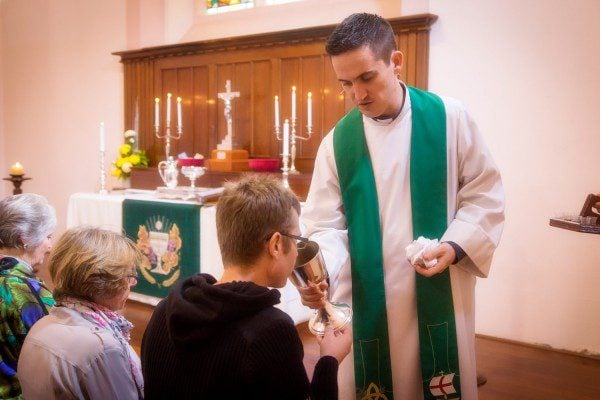Over half of America’s states–26 in all–have laws prohibiting minors from drinking the wine in Holy Communion. I’ve never heard of those laws ever being enforced–have you?–but the laws provide an interesting test case for religious liberty and for the religious civil disobedience we have been discussing.
and JEvaluating Religious Liberty in the States. It is about a study, which you can access here, designed to measure how well the various states protect religious freedom. Their metric looks at 48 specific areas, giving one point for each, then tabulates the totals to form an index that makes possible a comparative assessment to the states’ commitment to religious liberty.
The findings and the article about them are interesting in themselves, but one of those 48 areas jumped out at me: “states that exempt clergy from prohibitions against serving alcohol to minors.” That is to say, while all states have a drinking age of 21, twenty-four states have added an exception for the religious or sacramental use of alcohol. But 26 states have not.
Here is the issue, as explained in the study:
In order to receive federal funds, states must maintain a minimum age of 21 years for both the purchase and the public possession of alcohol. Notably, and critically for this safeguard, federal law does not make requirements on states with respect to furnishing broadly understood, which would include dissemination of alcohol by clergy in a religious ceremony, or consumption, which would include consumption by minors within ceremonies. All states comply with the federal requirement but may make exceptions to their own laws about furnishing and consumption for a variety of reasons, including parental discretion and consent, learning opportunities for culinary students, medical treatment, and participation in religious ceremonies.
Here are the states with no religious exemption for laws against either furnishing alcohol to a minor (what the pastor would do) or consuming alcohol by a minor (what the young communicant would do):
- Alabama
- Alaska
- California
- Florida
- Idaho
- Kentucky
- Maine
- Massachusetts
- Minnesota
- Mississippi
- Missouri
- New Hampshire
- New
- Texas
- Vermont
- Virginia
- West Virginia
Here are the states with a religious exemption to the laws against furnishing, but no religious exemption to the laws against consuming. That is, pastors could offer the communion wine, but it would be illegal for communicants under the age of 21 to receive it:
- Arkansas
- Indiana
- Kansas
- Pennsylvania
- Wisconsin
Here are the states with a religious exemption to the laws against consuming, but no religious exemption to the laws against furnishing. That is, it would be illegal for pastors to offer the communion wine, but communicants under the age of 21 could receive it:
- Colorado
- Louisiana
- Michigan
- Nevada
I doubt that forbidding teenagers from receiving the sacrament was intentional on the part of lawmakers. And I don’t think think any of these states have ever arrested pastors for giving alcohol to a minor, busted recent confirmands for underaged drinking, or requiring churchgoers to be carded before going up for communion. But they could.
Those laws are on the books. And Christians are subject to them. Some might say, on the basis of Romans 13, that it is always a sin to disobey the temporal authorities. But this would seem to be a case in which “we must obey God rather than men” (Acts 5:29). Still, there is a tension here, a cognitive dissonance. for churchgoers who feel an obligation to be both good law-abiding citizens and faithful Christians.
I suppose this is no problem for Catholics, since they believe after consecration the wine isn’t wine anymore, having been transubstantiated into just the blood of Christ. The state wouldn’t see it this way, of course, and could enforce its laws, but there would be no question of conscience for priests, young communicants, or their parents worried about violating the law.
At any rate, this would be a relatively new issue for Catholics, since laity used to be communed in one kind; that is to say, refused the cup. This was a huge issue for the Reformation, but after the Second Vatican Council in the sixties, Rome permitted giving the laity the cup with the permission of the local bishop. But, according to Wikipedia, many parishes still give laity only the bread.
And most Protestants in the USA use grape juice instead of wine in the Lord’s Supper, so they are compliant.
But this would be a big problem for the Orthodox (who give communion wine in a spoon to infants), to Anglicans, and us Lutherans. For us, Holy Communion is not just symbolic, but an actual means of grace in which Christ gives us His true body and His true blood for the remission of our sins. We must follow what He instituted and do what He commanded: “This cup is the new covenant in my blood. Do this, as often as you drink it, in remembrance of me” (1 Corinthians 11:25).
In the Lutheran Church Missouri Synod, the typical age for confirmation and reception of the Lord’s Supper is 14. Perhaps confirmation classes would mean more to our young people if they learned that they were being prepared to do something illegal.
At any rate, note that some of the “most Lutheran” states–Missouri, Minnesota, Texas, Indiana, Wisconsin, Michigan–have laws against communion wine for teenagers.
If you are breaking the law every Sunday, maybe you could ask your state representatives to change that law!
Photo: “Holy Communion at Bethlehem,” Bethlehem Lutheran Church, Adelaide, Australia

















